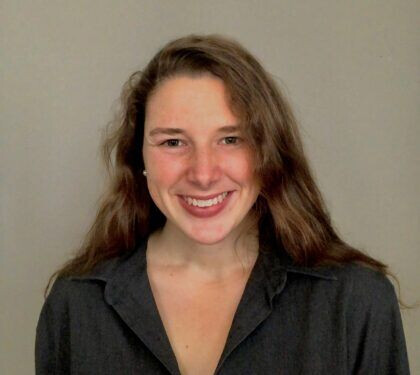Introducing Helen Vanbeck
I grew up far away from the corn fields, in the urban-sprawled, concrete-covered city that is Houston, Texas. During the summers, when my brothers and I would visit our grandparents in Iowa, proudly wearing our Hawkeye gear, I remember being mesmerized by the rows of corn we’d pass on our way in and out of town each day. In high school, I began to get interested in environmental issues, becoming really concerned about the impacts of climate change. I also thought about those corn fields in Iowa. How was climate change going to affect the corn fields? How were the corn fields contributing to climate change? What could we do differently to protect the corn and the farmers who grew it, while also protecting the environment we all depend on?
After high school, I decided to pursue these questions and attended the University of California Davis to study environmental policy and sustainable agriculture. As a student, I was involved in on-campus composting programs, worked on the Student Farm, and participated in climate activism. I also helped to co-organize the annual Food Justice Summit and served as the Director of the Community Gardens on campus. I found answers to my original questions, expanded my scope of knowledge, and I also started identifying new questions that I carry with me today on the history, accessibility, and equity of our agricultural system.
After graduating, I moved to Vermont, where I worked briefly on environmental, climate, and rural policy issues for the state’s transportation agency. I also volunteered with a gleaning organization that harvested excess produce from Vermont’s vegetable farms and apple orchards, that then connected the left-over food with soup kitchens, food banks, and school cafeterias. In the midst of the COVID pandemic, I moved to Washington, D.C. to intern with a congressman from a rural, agricultural district in California. I hoped to see how federal policy could be used to solve the most important issues facing our society today like rising economic and racial inequality and the catastrophic effects of climate change.
Photo by April OpatikWhile in D.C., I found my way back to the world of food and ag and spent the summer supporting Field to Market: The Alliance for Sustainable Agriculture as their Communications Intern. In this role, I had the chance to work with farmers, agricultural advisers, and conservation leaders across the country who were advancing sustainable agriculture outcomes in their communities. I was reinvigorated by the incredible opportunity for commodity agriculture to play a significant role in helping to mitigate the impending climate crisis. And I couldn’t help but think again about all those corn fields.
I am so excited to be joining the Midwest team as the Midwest Program Assistant, to keep asking questions about where and how we can do better, and to learn from the leaders who are growing our food, stewarding the land, and helping to mitigate the effects of climate change. I’m thrilled to be a part of American Farmland Trust’s holistic approach to building, empowering, and protecting vibrant agricultural communities, resilient farms, and a healthy environment for all.




